 Whether you consider them “rules” or “grandma’s cooking tips,” they may hold some truth…
Whether you consider them “rules” or “grandma’s cooking tips,” they may hold some truth…
or they may actually be myths that we have been doing all this time…
just because!
You know the tips we are talking about, the ones like “when cooking with aluminum foil, always put the shiny side down.” Or “add oil to your cooked pasta or it will stick together.” We even had someone in a recent cooking class who asked why we didn’t peel our mushrooms (that is a “rule” she learned from her mom)!
Maybe you first learned some of these tips in home ec class (remember those?!), or maybe your mom or grandmother told you this is how it is done. The reasons why you follow these “rules” may seem to make sense, or perhaps it leaves you thinking “I have no idea why, it’s just the way we have always done it.”
Some of you may remember the entertaining story Zonya tells about the “rule” when cooking a ham. If you haven’t heard the story, check it our video:
Are these truths or myths?!
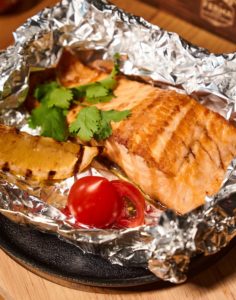 Shiny side down? I will never forget in middle school home economics class, we were taught the dull side of aluminum foil should always be facing up. This will absorb the heat and help the food cook better, right? This is a myth! The reality is that the difference between the shiny and the dull side is so slight it will make practically no difference in your cooking. So, the next time you are wrapping that potato in foil for baking, don’t stress about which side of the foil is facing up or down. How tight you wrap it will probably make a bigger difference because any air trapped inside can act as a barrier to the heat reaching the food.
Shiny side down? I will never forget in middle school home economics class, we were taught the dull side of aluminum foil should always be facing up. This will absorb the heat and help the food cook better, right? This is a myth! The reality is that the difference between the shiny and the dull side is so slight it will make practically no difference in your cooking. So, the next time you are wrapping that potato in foil for baking, don’t stress about which side of the foil is facing up or down. How tight you wrap it will probably make a bigger difference because any air trapped inside can act as a barrier to the heat reaching the food.
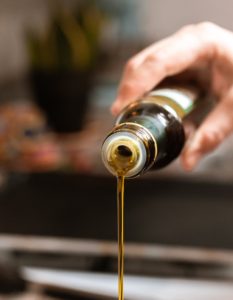 Add oil to your pasta? Another myth! When cooked, pasta sticks together because of the starches that are released. To help prevent this, a better approach is to return the water to a boil as quickly as possible after the pasta is added and stir the pasta a few times while it is cooking. The problem with adding oil after cooking is it can prevent the sauce from sticking to the pasta. This is the same reason you shouldn’t add oil to the pasta water. Lidia Bastianich, a famous Italian chef, sums it up best when she says, “Never, never put oil in the water. Oil will coat your pasta and will inhibit the sauce to grasp on to your cooked pasta.”
Add oil to your pasta? Another myth! When cooked, pasta sticks together because of the starches that are released. To help prevent this, a better approach is to return the water to a boil as quickly as possible after the pasta is added and stir the pasta a few times while it is cooking. The problem with adding oil after cooking is it can prevent the sauce from sticking to the pasta. This is the same reason you shouldn’t add oil to the pasta water. Lidia Bastianich, a famous Italian chef, sums it up best when she says, “Never, never put oil in the water. Oil will coat your pasta and will inhibit the sauce to grasp on to your cooked pasta.”
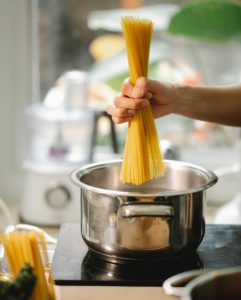 Salt the water? While we’re on the pasta topic, what about salting the water? It is true, this is a great way to season your pasta. The salt can actually absorb into the pasta (vs. just adding salt at the end of cooking). Many chefs are very generous in salting their pasta water (even saying it should taste like seawater). At home, you can add as much as you want – experiment to see what you like best! Although, just in case you’re wondering, the salt won’t do anything to keep the pasta from sticking. So, true for seasoning, myth for stick-prevention!
Salt the water? While we’re on the pasta topic, what about salting the water? It is true, this is a great way to season your pasta. The salt can actually absorb into the pasta (vs. just adding salt at the end of cooking). Many chefs are very generous in salting their pasta water (even saying it should taste like seawater). At home, you can add as much as you want – experiment to see what you like best! Although, just in case you’re wondering, the salt won’t do anything to keep the pasta from sticking. So, true for seasoning, myth for stick-prevention!
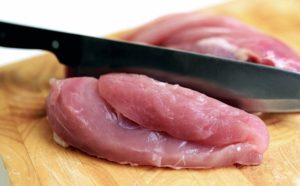 Rinse your raw chicken? Everybody knows you should rinse raw chicken before cooking it, right?! (My mom and grandma both did this!) Actually, there are good reasons you should NOT do this — so this myth is busted! Dr. Donald Schaffner, a professor of food science at Rutgers University says, “Never wash your raw poultry. It doesn’t do much to remove bacteria. What it will do is take the bacteria from the bird and spread it around your kitchen.” Just envision the water from your kitchen faucet hitting the chicken and splattering in your sink and on your countertops. To kill any harmful bacteria, the best bet is to cook it to the proper internal temperature (the USDA recommends 165 degrees). Washing your chicken can also keep it from getting browned and crispy. You might even consider using paper towels to soak up any moisture on the chicken to help it brown and crisp up.
Rinse your raw chicken? Everybody knows you should rinse raw chicken before cooking it, right?! (My mom and grandma both did this!) Actually, there are good reasons you should NOT do this — so this myth is busted! Dr. Donald Schaffner, a professor of food science at Rutgers University says, “Never wash your raw poultry. It doesn’t do much to remove bacteria. What it will do is take the bacteria from the bird and spread it around your kitchen.” Just envision the water from your kitchen faucet hitting the chicken and splattering in your sink and on your countertops. To kill any harmful bacteria, the best bet is to cook it to the proper internal temperature (the USDA recommends 165 degrees). Washing your chicken can also keep it from getting browned and crispy. You might even consider using paper towels to soak up any moisture on the chicken to help it brown and crisp up.
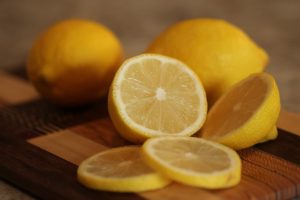 Roll lemons and limes? This one is true! Not only will this impress your guests, but rolling them on a hard surface using the force of your palm can actually help break down the fibrous membranes inside and help them to release their juices more easily. Some experts also recommend putting the fruit in the microwave for 20 to 30 seconds to make it even easier to get the juices out. Roll it, warm it, cut it, juice it!
Roll lemons and limes? This one is true! Not only will this impress your guests, but rolling them on a hard surface using the force of your palm can actually help break down the fibrous membranes inside and help them to release their juices more easily. Some experts also recommend putting the fruit in the microwave for 20 to 30 seconds to make it even easier to get the juices out. Roll it, warm it, cut it, juice it!
 Don’t cut your lettuce? You may have heard that you shouldn’t use a knife to cut your heads of lettuce (instead, you should use your hands to tear them into pieces). The theory is the knife can cause the lettuce to discolor faster because it causes bruising. Plus, if there is any deterioration in the steel of the knife, this can create issues. It turns out you don’t really need to worry about how you are cutting your lettuce – another rule busted! There is no discernable difference in how the lettuce perishes based on how you cut it. So, go ahead and cut away!
Don’t cut your lettuce? You may have heard that you shouldn’t use a knife to cut your heads of lettuce (instead, you should use your hands to tear them into pieces). The theory is the knife can cause the lettuce to discolor faster because it causes bruising. Plus, if there is any deterioration in the steel of the knife, this can create issues. It turns out you don’t really need to worry about how you are cutting your lettuce – another rule busted! There is no discernable difference in how the lettuce perishes based on how you cut it. So, go ahead and cut away!
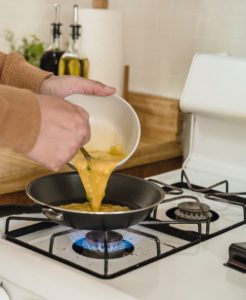 Add milk or cream for velvety scrambled eggs? Believe it or not, this one is quite controversial! Some people swear adding milk or cream (or even sour cream) creates a creamier consistency. However, there are others who believe it has more to do with how you cook them – low and slow! Other tips include don’t overbeat the eggs (just enough to combine the yolks with the whites); let the eggs cook slowly (stirring less if you want larger pieces or stir more for smaller pieces); and you can also add a little butter or oil before adding the eggs, if desired, to help keep them from sticking. Remember, use low heat and be patient for that velvety texture (it may take several minutes before the eggs start to cook and form).
Add milk or cream for velvety scrambled eggs? Believe it or not, this one is quite controversial! Some people swear adding milk or cream (or even sour cream) creates a creamier consistency. However, there are others who believe it has more to do with how you cook them – low and slow! Other tips include don’t overbeat the eggs (just enough to combine the yolks with the whites); let the eggs cook slowly (stirring less if you want larger pieces or stir more for smaller pieces); and you can also add a little butter or oil before adding the eggs, if desired, to help keep them from sticking. Remember, use low heat and be patient for that velvety texture (it may take several minutes before the eggs start to cook and form).
And, by the way, just to clarify, there is no need to peel those mushrooms!
What are some other quirky cooking “rules” you have always wondered about?
Please share – we want to hear them!
 LEARN MORE ABOUT THE NAPKIN!
LEARN MORE ABOUT THE NAPKIN!

Good info! Glad a knife doesnt make a difference when cutting lettuce!!